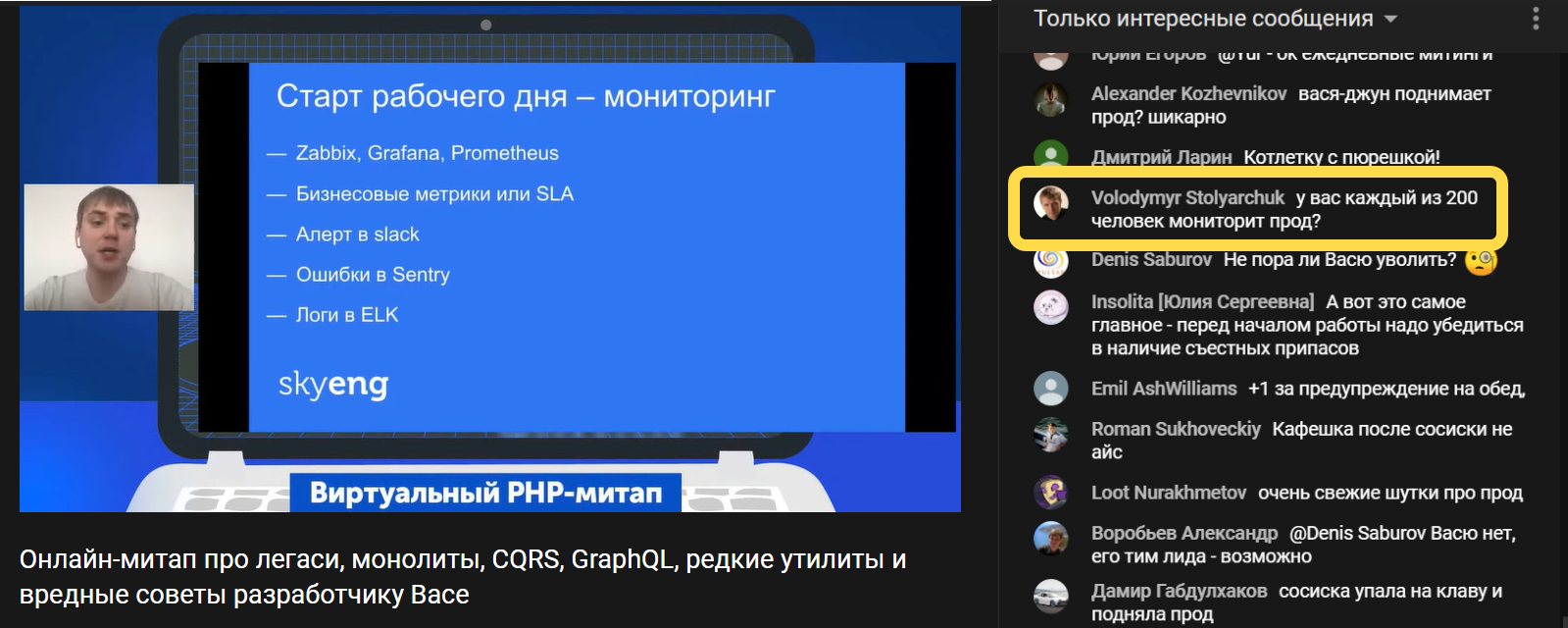In some the moment I wondered why this is happening. And he began to dig the topic of cognitive distortions.
I would like to share my observations this Thursday with Grigory Petrov, Anton Nazarov and the Zinc Prod podcast. Connect
Remembering my university course in logic and armed with popular science videos on the topic, I sat down to deal with cases from my recent experience.
Quarantine began. A month before that, I promised to come to the meetup to talk about the topic of remote shooting, which was then niche. The meeting, for obvious reasons, was moved online, many people managed to get an unwanted (and often negative) experience of remote work by the time of the broadcast.

If anything, the recording of the performance is available here .
An example of cognitive distortion happened before my eyes.The report featured "the developer Vasya" - the alter ego of the less experienced me, 8-10 years ago. Actually, on his rake, I tried to show how not to go to work outside the office. Vasya's exaggerated behavior was glued to the logo of the company I work for now, and some of the listeners began to associate my long-standing mistakes with the habits of 160+ developers in it. Despite the fact that all these guys have long been at a remote location and have gone through their own rake, there was even a disclaimer about it. But our memory is selective ...
This is how we decide, for example, that "A has Kubernetes, they write about it in B, most companies have it, we will be cool with it"(a conditional example, let's not start a holivar around him) - we are looking for confirmation of our feelings, we ignore the opposite. As a result, we collect more points "for" so that the decision looks weighty - and at best we give birth to a report on heroic overcoming of the rake, and at worst it happens like this:
“Due to a bug in Google WebView, the application crashed for hundreds of thousands of users. We decided to switch to the engine from Mozilla. We rewrote the application for 2 months. Rolled out without WebView. Users began to complain even more: complex 2d graphics were slowly rendering in the new engine. We saw that fps was sagging, but did not pay attention, because we fixed something else. Meanwhile, Google fixed the bug. And we decided to roll back everything that the team had been doing these months. "
The story is told on condition of anonymity
Such stories are collected by Anton M0rtyMerrNazarov: this spring he made an excellent report on why the rational does not always "click" in our head when choosing projects and solutions in them. And after the speech he interviewed the audience on condition of anonymity.
Details aside, many stories about bad decisions are structured like this:
- really wanted / believed in some technology or approach, undertook to try - and did not complete or did not take into account something that lay on the surface,
- thought too well of themselves, the project, the timing, the future and all of this together - but in reality "it turned out that ...",
- now we have gained such an experience and are ready to defend this knowledge until blue in the face - read, holyivate.
These patterns are a consequence of cognitive biases in planning and decision-making, which Gregory talks about so well.eyeofhellPetrov. An idea came up - to get together and discuss such personal experience through the prism of a popular science approach. And if three people in 2020 want to talk, they write a podcast;) It came in handy to meet the guys from the podcast , where they regularly raise holivar topics.
In general, on Thursday we will talk about cognitive distortions and their manifestations in IT using real examples:
- how our ideas about languages, frameworks, libraries and approaches to development are formed and why are distorted,
- how we break our own logical chains and allow distortions to penetrate our decisions, documentation, argumentation, etc.,
- and at the same time we will discuss what helps to move away from the "holivarinya" and begin to doubt "I know for sure" and "it is common knowledge."
Connect to live - you can not only listen and comment, but burst in with your voice, tell your story or ask for advice. It is enough to have a Youtube account.
ps If it turns out well, of course, we will publish a transcript of selected moments and additional links on the topic.